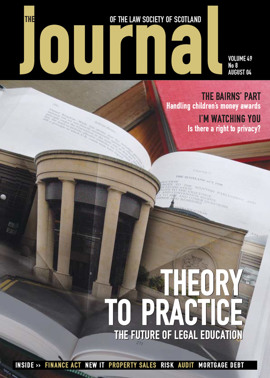Tangle o' the Isles
Family practitioners will recall the confusion which surrounded the status of registered agreements containing provision for child aliment, in the late 1990s. A recent Court of Session decision may have reawakened this issue.
By virtue of section 4(10) of the Child Support Act 1991, the Child Support Agency was precluded from making any maintenance assessment in a case where there already existed a “maintenance order”. In Scotland, it has long been common practice for parties to deal with financial issues arising from separation, not in the form of a court order, but instead within the body of a minute of agreement, which is registered for preservation and execution in the Books of Council and Session. In 1999, a Child Support Commissioner decided that an extract of a minute of agreement registered in the Books of Council and Session constituted a “maintenance order” for the purposes of the Act (Isles, Commissioner’s Case No CSCS/5/97, 1999 Fam LR 37).
Anxious times for lawyers
This decision meant that parties who had entered into a written maintenance agreement had no right of recourse to the CSA, if either of them wished to review the level of maintenance provided for in the agreement. Instead, a summary application required to be presented to the courts seeking variation of the agreement (the only justifiable basis for variation being a material change in circumstances). It is fair to say that this period was an anxious one for family lawyers attempting to provide clear advice on this topic. How many clients were advised that they would have a right of recourse to the CSA should they become dissatisfied with the level of aliment provided for in a written agreement, only for this possibility to be torpedoed by the Isles decision?The 2003 regime
New arrangements which addressed this point, were introduced on 3 March 2003. In terms of the new regime, the CSA has jurisdiction to entertain an application for an assessment, even if there is a court order or registered minute of agreement in place, provided that the order was made or the agreement entered into on or after 3 March 2003 and has been in existence for more than one year (sections 4(10) and 7(10) of the 1991 Act as amended). It is accordingly still possible to enter into a written maintenance agreement, but its provisions can only be relied on for one year.No negligence after all?
However, Isles has been looked at again in a recent Court of Session case, Woodhouse v Wright Johnston & Mackenzie (Temporary Judge Coutts, 2 July 2004). In this case, Mrs Woodhouse sued her solicitor for damages, averring that she had lost the opportunity of agreeing a larger figure for aliment for her child, as a result of his advice. Mrs Woodhouse had entered into a minute of agreement with her estranged husband in February 1999 which provided, inter alia, for aliment of £50 per month to be paid to Mrs Woodhouse in respect of the parties’ child. Mrs Woodhouse’s solicitor had advised her, in November 1998, that if the parties disagreed about the appropriate level of aliment payable at any time in the future, it was always open to her to apply to the CSA for an assessment. This advice was, of course, provided several months prior to the publication of the Isles decision. In June 2001, Mrs Woodhouse submitted an application to the CSA who discontinued it on the basis that the registered minute of agreement constituted a maintenance order for the purposes of the Act, thus depriving the CSA of jurisdiction.At procedure roll, the action was dismissed by T G Coutts QC, sitting as a temporary judge. He held that Mrs Woodhouse’s solicitor could not reasonably be expected to have made enquiries of the CSA on this matter in advance of the Isles decision being reported. However, he also took the view that the decision in Isles was, quite plainly, erroneous. Indeed, the debate in this case had proceeded on agreement on the part of both parties’ counsel to the effect that the decision in Isles was wrong in law.
So, where does this leave Isles and the many minutes of agreement which continue to govern payment of aliment for children? Temporary Judge Coutts was careful to make “no decision about the competence of an Outer House judge to overrule a decision of the Social Security Commissioner”. The Child Support Agency advises that it is presently examining the implications of the decision in Woodhouse and is meantime continuing to deal with cases in accordance with Isles and the existing legislation. How the CSA ultimately deals with this decision remains to be seen.
Rhona Adams, Partner, Morton Fraser Family Law Team
In this issue
- Making the system work
- Sole survivors?
- Firm foundations
- The paper trail
- Private lives in public
- IT: what next?
- Roll again
- Destiny's child
- The great day comes
- SOX education
- Peer review: staying on target
- Obituary: James D Wheelans, CBE
- Obituary: JAMES D WHEELANS, CBE (1)
- Time, gentlemen?
- Plain English has landed
- Tangle o' the Isles
- Hunting down the pirates
- Scottish Solicitors' Discipline Tribunal
- Website reviews
- Book reviews
- How much law, anyway?
- FSA's net widens






